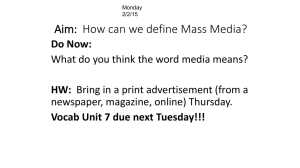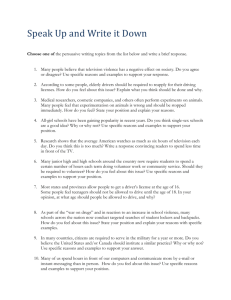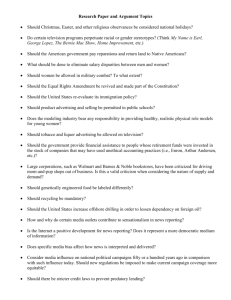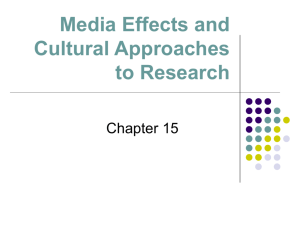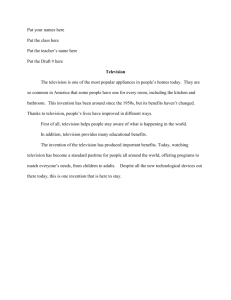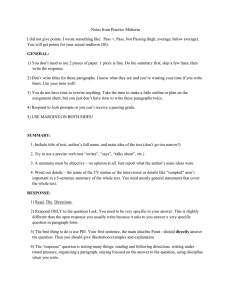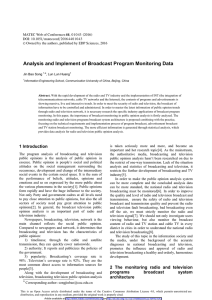Aim: What is Mass Media?
advertisement
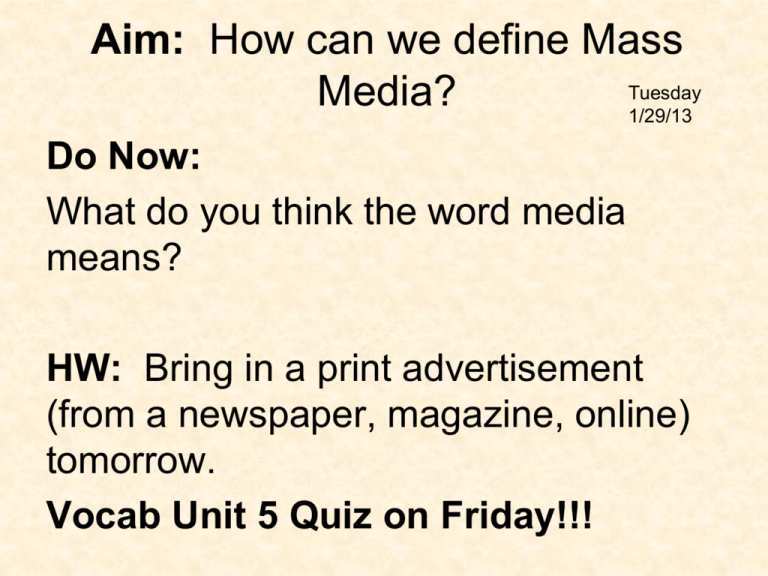
Aim: How can we define Mass Tuesday Media? 1/29/13 Do Now: What do you think the word media means? HW: Bring in a print advertisement (from a newspaper, magazine, online) tomorrow. Vocab Unit 5 Quiz on Friday!!! Intro: • Textbook Distribution • Take a few minutes to thumb through the textbook. • Overview of the course. – Books, Advertising, Radio, Television, Film • Projects– Children's book, Advertisement, Film I. What are mass media? (Grammar NOTE: Yes, I mean ‘are’. There are many types. “Media” is the plural of “medium”. Have you heard of the show Medium? A. History of mass media • Human desire and need to break the barriers of time and distance – Live beyond a lifetime – Move beyond the distance we can physically travel – Like space…the final frontier B. Definitions • Medium: a channel or system of communication – Speech is most widely used • Others: painting, sign language, written word, music, images, smoke signals • Mass medium: means of communicating to a large number of people – Television, radio, newspapers, magazines, books, films, recordings, internet • Not possible until the invention of the printing press in 1458 by Johannes Gutenberg MORE Definitions • Personal communication media: – Method of communication through time and space, but not involving the masses • Broadcast media: radio and television – Using electric signals to reach a large audience – Cable television: not broadcasting because wires are used to carry the programs to specific households. II. Global View of Broadcasting • A. USA: – Radio – mostly music and DJs; all-news station and talk show (sports) – Television – daytime drama, sitcoms, adventure, game shows, news, reality TV, PBS (culture and education) • B. Europe and Canada: – More cultural and educational TV – Governments believe that advertising should not control programming • Ex: BBC – no advertising / supported by tax paid through TV and radio sales • Small countries: buy US television shows (dubbed) even if they are inconsistent with the country’s perceived / accepted value system • Communist and 3rd world nations: all broadcasting is controlled by the government – Governments use stations to encourage patriotism and control news • (governments own and operate most of the world’s radio and television stations) – Radio transmitters guarded by high fences and machine guns – Rebels attempt to overthrow government through broadcast transmitters Control of broadcasting means control of minds… What do mass media produce? • The Role of Celebrity (What need do celebrities fill?) – Concept expanded when technology made possible the duplication and distribution of images. – Fulfill the public need of fantasy • Audience identifies with celebrities who live out fantasies • “Stars” – different, but not too different from their fans – Celebrity = glamorous self Celebrities - continued • Development of Hollywood – Stars must lead glamorous lives (created if necessary) – pseudo events whose purpose is to attract attention – Recording industry followed the lead (Motown Records) Changes caused by mass media • Before Mass Media • Well-known people were famous for actions or achievements • Public knew and admired heroes • Since Mass Media • Well known because of manufactured image • Public knows and admires celebrities What is media? • Take out a piece of paper and write down the following terms. – Culture – Mass communication – Mass media Definitions • Culture – The symbols of expression that individuals, groups, and societies use to make sense of daily life and to articulate their values. • Mass communication: – The process of designing and delivering cultural messages and stories to large diverse audiences through media channels as old as the book and as new as the Internet. • Mass Media – Are the cultural industries-the channels of communication-that produce and distribute songs, novels, newspapers, movies, Internet services, and other cultural products to large numbers of people. Topics for Discussion • Oral and Written Form Begin the Dialogue • Printed Communication Spreads the Word • Electronic and Digital Communication Bring Immediacy to the Message • Media Convergence Comes of Age Answers the following: • What are the key technological breakthroughs that accompanied the transition to the print and electronic eras? • Why were these technologies significant? Pick an example of a popular media product that you think is harmful to children. How would you make your concerns known? Should the product be removed from circulation? Why or why not? Although in some ways postmodern forms of communication, such as email, facebook, etc., have helped citizens participate in global life, in what ways might these forms be harmful? Turn to page 16. Examine the “Culture Skyskraper.” Where do your interests fall? Do you see your interests moving up at all as you get older? Media Literary and Steps in the Critical Process (pg. 28) • With a partner: write a brief outline of an argument either defending or condemning social media (Facebook, twitter, etc.). • In other words, are social media more useful or more harmful. Summary: • What is Mass Media? • HW: Bring in a print advertisement (from a newspaper, magazine, online) tomorrow. • Vocab Unit 5 Quiz on Friday!!! Case Study • After completing this exercise we will read a case study on pg. 15. (Staging Stunts Takes TV to New Low)
